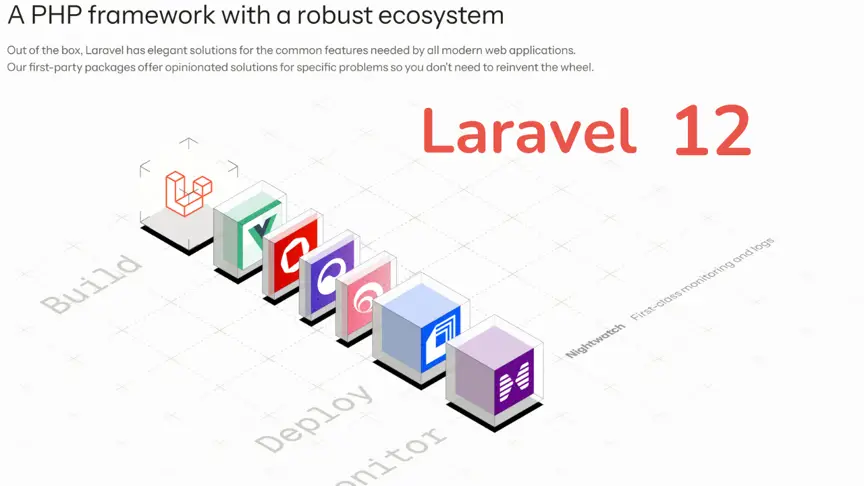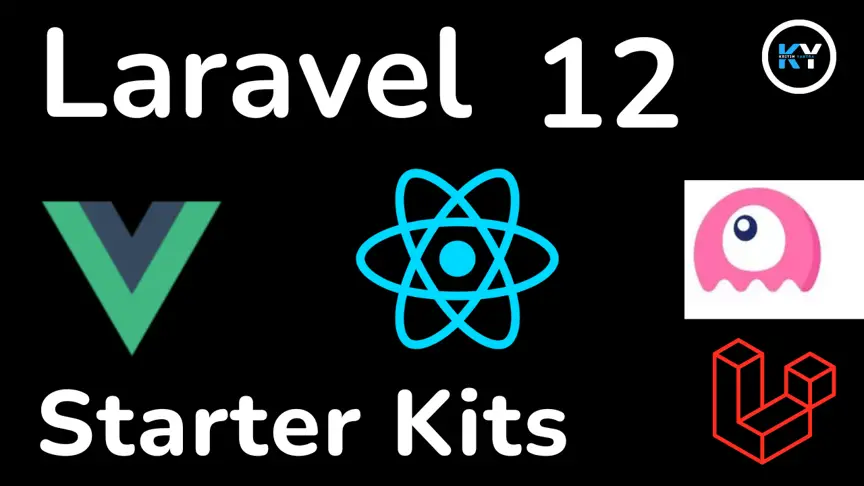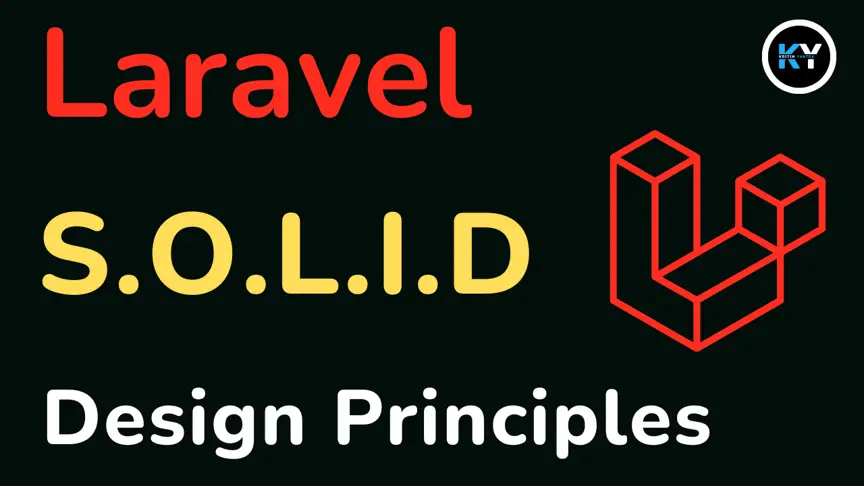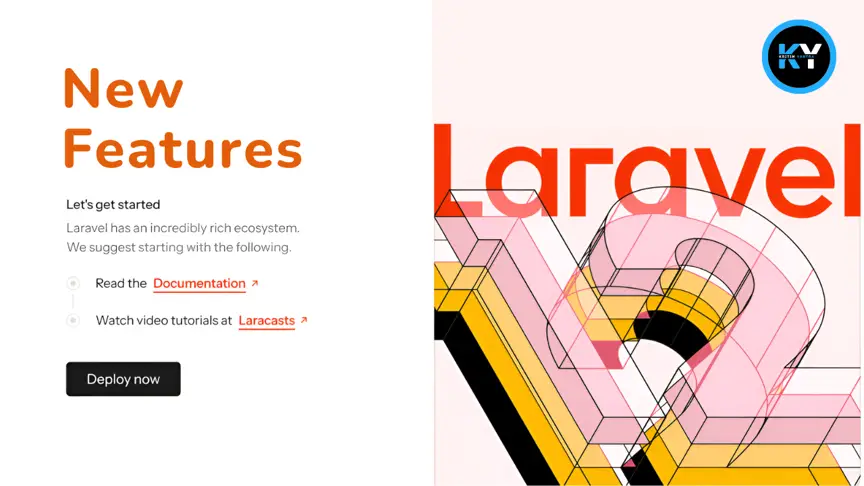Laravel 12 Unleashed: Early Insights & What Lies Ahead

Kritim Yantra
Feb 24, 2025

Laravel has always set the standard for modern web development. With the release of Laravel 12, the framework not only refines its core but also introduces a host of groundbreaking features—ranging from asynchronous caching to enhanced dependency injection—that empower developers to build faster, more secure, and scalable applications. In this comprehensive guide, we merge the highlights from Laravel 12’s evolution with a deep dive into its most innovative features and improvements.
A New Chapter in Laravel Evolution
Laravel 12 is more than an upgrade—it’s a reimagining of web development. It leverages modern PHP 8 capabilities, integrates AI-assisted debugging, and introduces advanced performance optimizations that simplify the development process while delivering impressive speed and reliability.
Versioning and Long-Term Support
Each Laravel release is supported with a clear roadmap. Laravel 12 will receive bug fixes for 18 months and security updates for up to 2 years, ensuring you can build and scale your applications with confidence.
| Version | PHP Compatibility | Release Date | Bug Fixes Until | Security Fixes Until |
|---|---|---|---|---|
| 9 | 8.0 – 8.2 | Feb 2022 | Aug 2023 | Feb 2024 |
| 10 | 8.1 – 8.3 | Feb 2023 | Aug 2024 | Feb 2025 |
| 11 | 8.2 – 8.3 | Mar 2024 | Sep 2025 | Mar 2026 |
| 12 | 8.2 – 8.3 | Q1 2025 | Q3 2026 | Q1 2027 |
Accelerated Performance & Efficiency
Laravel 12 is built for speed. One of its major breakthroughs is asynchronous caching, which offloads cache operations to the background—ensuring a smoother user experience even during peak times. Combined with advanced query optimization and PHP 8’s JIT compilation, your applications will experience blazing fast response times.
Innovative Features Empowering Developers
1. Asynchronous Caching for Real-Time Performance
No more waiting on slow cache operations. Laravel 12 introduces an asynchronous caching method that runs in the background, providing a more responsive experience.
Before:
use Illuminate\Support\Facades\Cache;
$user = Cache::remember("user_{$id}", 600, function() use ($id) {
return User::find($id);
});
After:
use Illuminate\Support\Facades\Cache;
$user = Cache::rememberAsync("user_{$id}", 600, function() use ($id) {
return User::find($id);
});
2. Streamlined Dependency Injection with PHP 8 Features
Laravel 12 fully embraces constructor property promotion, reducing boilerplate code and making controllers cleaner.
Before:
class OrderController
{
protected $orderService;
public function __construct(OrderService $orderService)
{
$this->orderService = $orderService;
}
}
After:
class OrderController
{
public function __construct(private OrderService $orderService) {}
}
3. Next-Generation Eloquent ORM Features
The Eloquent ORM now supports conditional eager loading and more flexible relationship constraints, enabling you to build complex queries with less code.
Before:
$orders = Order::with(['items' => function($query) {
$query->where('status', 'shipped');
}])->get();
After:
$orders = Order::withFiltered('items', ['status' => 'shipped'])->get();
4. Optimized Queue & Job Handling
With dynamic job prioritization and advanced retry strategies, Laravel 12 ensures that your critical tasks are processed first.
Before:
dispatch(new ProcessPayment($payment))->onQueue('high');
After:
dispatch(new ProcessPayment($payment))->setPriority('high');Additional Enhancements & Breaking Changes
5. WorkOS AuthKit Integration
Feature: Integrates WorkOS AuthKit for SSO, social login, and passkeys in starter kits, offering an alternative to traditional authentication.
Before (Laravel 11):
// routes/web.php
use Laravel\Socialite\Facades\Socialite;
Route::get('/auth/redirect', fn() => Socialite::driver('github')->redirect());
Route::get('/auth/callback', fn() => Auth::login(Socialite::driver('github')->user()));
After (Laravel 12):
// routes/web.php (with WorkOS AuthKit enabled)
use WorkOS\Laravel\AuthKit;
Route::get('/auth/workos', [AuthKit::class, 'redirect']);
Route::get('/auth/workos/callback', [AuthKit::class, 'handleCallback']);
Configuration adjustments in config/auth.php may be required:
'workos' => [
'client_id' => env('WORKOS_CLIENT_ID'),
'client_secret' => env('WORKOS_CLIENT_SECRET'),
'redirect' => '/auth/workos/callback',
],
6. Updated Dependencies (Carbon 3.x)
Feature: Laravel 12 now requires Carbon 3.x, dropping support for Carbon 2.x, with minor API adjustments.
Before (Laravel 11):
// composer.json
"require": {
"laravel/framework": "^11.0",
"nesbot/carbon": "^2.0"
}
After (Laravel 12):
// composer.json
"require": {
"laravel/framework": "^12.0",
"nesbot/carbon": "^3.0"
}
use Carbon\Carbon;
$date = Carbon::parse('2024-01-01')->plusDays(10); // Carbon 3.x preferred syntax
7. Schema::getTableListing Enhancement
Feature: Schema::getTableListing() now returns schema-qualified table names by default.
Before (Laravel 11):
use Illuminate\Support\Facades\Schema;
$tables = Schema::getTableListing(); // ['users', 'posts']
After (Laravel 12):
use Illuminate\Support\Facades\Schema;
$tables = Schema::getTableListing(); // ['main.users', 'main.posts']
$tables = Schema::getTableListing(schemaQualified: false); // ['users', 'posts']
8. Concurrency::run with Associative Arrays
Feature: When using associative arrays, the keys are preserved in the results.
Before (Laravel 11):
use Illuminate\Support\Facades\Concurrency;
$result = Concurrency::run([
'task1' => fn() => 1 + 1,
'task2' => fn() => 2 + 2,
]); // [2, 4]
After (Laravel 12):
use Illuminate\Support\Facades\Concurrency;
$result = Concurrency::run([
'task1' => fn() => 1 + 1,
'task2' => fn() => 2 + 2,
]); // ['task1' => 2, 'task2' => 4]
9. mergeIfMissing with Dot Notation
Feature: Dot notation now expands into nested arrays, enabling cleaner data merging.
Before (Laravel 11):
$request->mergeIfMissing(['user.name' => 'John']); // ['user.name' => 'John']
After (Laravel 12):
$request->mergeIfMissing(['user.name' => 'John']); // ['user' => ['name' => 'John']]
10. Image Validation Rule Change
Feature: SVG images are no longer allowed by default in the image validation rule, enhancing security and consistency.
Before (Laravel 11):
$request->validate(['avatar' => 'image']); // Allowed PNG, JPG, SVG, etc.
After (Laravel 12):
$request->validate(['avatar' => 'image|mimes:png,jpg']); // SVG blocked
$request->validate(['avatar' => 'image|mimes:svg']); // Explicitly allow SVG
11. Laravel Installer Update
Feature: The updated Laravel installer now ensures compatibility with the new starter kits in Laravel 12.
Before (Laravel 11):
laravel new my-app # Uses Laravel 11 skeleton
After (Laravel 12):
composer global update laravel/installer
laravel new my-app # Installs Laravel 12 with new starter kits
Deprecations & Breaking Changes
Refined Soft Delete Restoration
Laravel 12 now prefers explicit restoration of soft-deleted records on a per-model basis, phasing out global restoration methods for more predictable behavior.
Updated Route Helper
The route() helper now accepts only string-based route names, ensuring a cleaner and more consistent API.
Transition to Method-Based Relationship Definitions
Array-based relationship definitions are deprecated. Define relationships as methods for better type-safety and IDE support:
public function comments() {
return $this->hasMany(Comment::class);
}
Revamped Validation Rules
The traditional same validation rule has been replaced by a more flexible compare rule:
$request->validate([
'password' => 'required|compare:password_confirmation',
]);
Robust URL Parsing
Legacy URL parsing helpers have been replaced by a more robust URL facade:
use Illuminate\Support\Facades\Url;
Url::parse($url);
Wrapping Up
Laravel 12 is a transformative release—melding cutting-edge performance optimizations, a refined developer experience, and a suite of innovative features. Whether you’re integrating advanced caching, leveraging new dependency injection paradigms, or exploring enhanced API development, Laravel 12 offers the tools you need to build the future of web applications.
At Kritim Yantra, we’re committed to keeping you ahead of the curve. Stay tuned for more in-depth guides, tutorials, and best practices as we continue to explore the new possibilities of Laravel 12. Happy coding!
Comments
No comments yet. Be the first to comment!
Please log in to post a comment:
Sign in with GoogleRelated Posts

Getting Started with Laravel Starter Kits: Build Apps Faster

Kritim Yantra

Understanding SOLID Design Principles in Laravel (For Beginners)

Kritim Yantra
